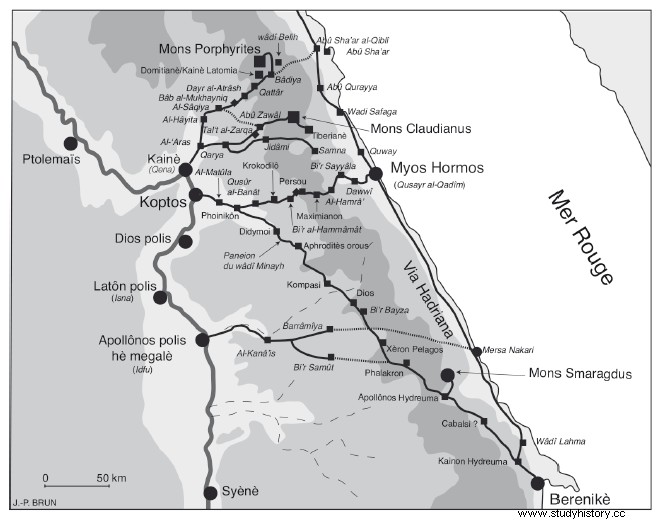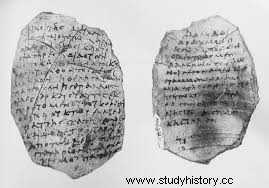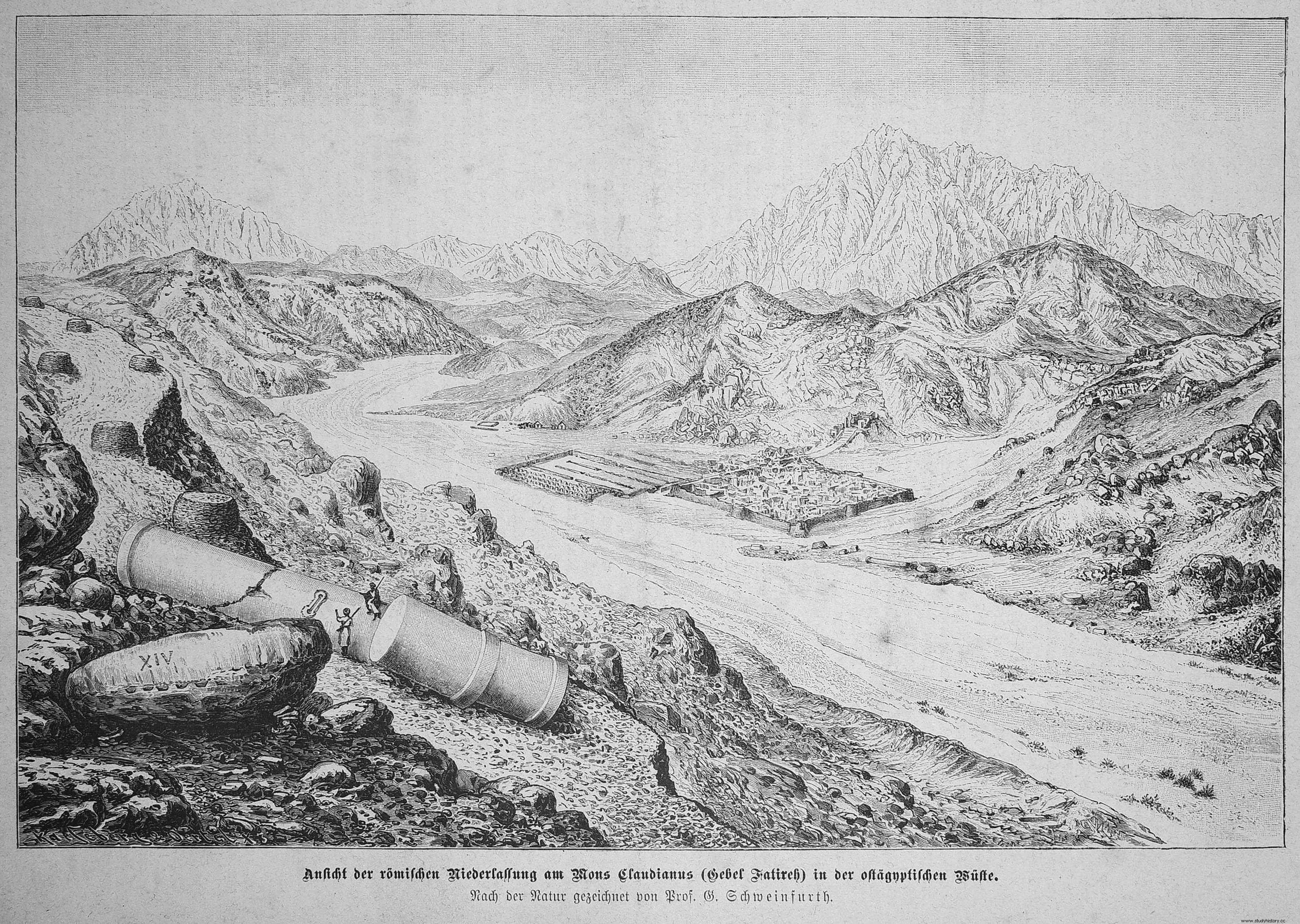Dear lovers of the most exalted ancient culture, today I would like to introduce you to none other than Philokles , one of the great persons of Egyptian national history . Doesn't ring a bell, you say? Could I introduce myself. The things Philokles dealt with were not all equally kosher, and history teachers simply don't like to dwell on that.
Philokles, the philanthropist
Philokles lived sometime around the end of the 1 th and start of the 2 the century AD on the edge of Egyptian society, literally and figuratively. Speed along the banks of the Nile on a pre-motorized jet ski to impress the local toothless beauties – all that sand was really bad for your teeth! – was not for him. He spent his life in the arid Eastern Desert between the Nile Valley and the Red Sea. This area was crossed by all kinds of trade routes, and along these routes were small Roman army camps at regular intervals.

Trade routes and Roman army camps in Egypt's Eastern Desert
These camps helped guard the trade caravans that made regular trips between Berenike and Myos Hormos on the coast, and mainly Koptos on the Nile. There were also several important quarries in this area, which were mainly used by the emperors to decorate their megalomaniac palaces in Rome. Each camp was inhabited by a handful of soldiers who often found themselves stone-dead for months at a time – pun intended – bored. There was not much to see there other than an unexpected Bedouin attack now and then. Until Philokles came on the scene.
Philokles wasn't a soldier himself, so what the hell was that guy going to be looking for? Life is already so short, and 2000 years ago it was usually even shorter than it is today. But our dear Philokles was a shrewd businessman, and soon realized that there was something to be gained from those homesick little soldiers. Under the motto "life is not a pony camp, because such beasts are too expensive in Egypt", he lashed all his possessions on the back of his camel, and left for the promised land.
The route through the Eastern Desert was known for trade with the Far East, from where all kinds of exotic products were imported. But Philokles didn't go that far. No, he plunged into a more modest market segment. The army did provide the soldiers with basic products, such as grain and wine (they were supposed to bake bread themselves, so you better have some pastry skills at your fingertips if you signed up for military service). But luxury products, such as meat and vegetables – yes, you read that correctly – the soldiers had to provide themselves. And that is simply not so obvious when you are in the middle of the desert. When Philokles became aware of this hole in the Eastern Desert Camp Market, the drachma marks no doubt began to flicker in his eyes.
From a to flea

The ostraca with letters of Philokles
We're pretty well aware of Philokles' dealings thanks to a whole bunch of ostraca recovered in two camps, Krokodilo and Didymoi. They are almost all letters written by himself or addressed to him. After wading through the moon rose fish book and finishing last in the calligraphy contest at the end of the school year, he decided he'd learned enough to go ahead with his plan. He thought vowels were overrated, especially the double ones, so he wrote just enough to make himself understood on potsherd:
Φιλοκλῆς καὶ Σ̣π ̣ ̣(l. Σκνὶψ) Καππάρι (l. Καππάρει) τ̣ῶ ἀδελφῶ πλῖ̣σ̣τα (l. πλεῖστα) χαίριν (l. χαίρειν) τὸ προσκύνημά συ (l. σου) ποῶ (l. ποιῶ) παρὰ τὸν̣ Π̣ᾶ̣ν̣α̣ν
“Philokles and Sknips greet Kapparis warmly to their brother. I have prayed for you to Pan …” (O. Did. 379, l. 1-4 )
Since his letters were found in several camps, he probably also entered the real estate market and invested in a cottage in different camps. Because stone walls are a bit chilly in themselves, even in such a hot climate as in Egypt, he had not one, but even two women in the house for the interior design aspect and the indispensable female finishing touch:an older lady. with the somewhat unfortunate name Sknips (which literally means 'flea'), and a - let's hope for Philokles - parasite-free damsel called Hegemonis .
Like Professor Willy Clarysse describes it in very careful terms:“It is not impossible for Philokles to have a ménage à trois had with both women, but since kinship terms such as 'brother' and 'sister' were used rather freely, we cannot be quite sure.” (So your 'brother' could effectively be your brother, or your husband, or your friend, your cousin, your dentist with whom you have built up a fairly intimate relationship after having ten sandy teeth pulled, etc.). I'm for the more daring hypothesis that Philokles had an SM addiction and brought in Hegemonis for some dirty talk and spanking (after all, her name means 'Führer ’). Or maybe he was just allergic to flea bites, and, yes, every poppa needs some sugar once in while .
Tournée générale
Many of the texts in Philokles' archives are about food, but it is not always clear whether the coals, onions, apples, sausages, wine, salted fish, chickens, pork or rabbit dung are for his own use or for his trade. His most lucrative venture, however, revolved around… hookers. At the request of the soldiers, Philokles sent girls to the camps. These girls, who were often very young, were taken to the camps via Koptos in the Nile Valley. For each girl 108 drachmas in import duties had to be paid. The average price for a lady companion was 60 drachmas for one month, on which 12 drachmas still had to be paid in taxes. Since there were about 15 soldiers in one camp, each paid about 4 drachmas for one month of "companion". That corresponds to about four days' wages. Some ladies were slightly more expensive than others, and in a few cases some individuals, probably senior officers, were able to order a girl for "private use".
The "work" these girls do in the camps is described in the sources as κυκλεύειν, which literally means "turning around". Normally this term is used in the context of irrigation, as in "turning the water wheel," and that is how it was initially translated by the editors of Philokles' letters. They did make the comment that it was rather strange that Philokles brought women to the desert, just to get water from the wells.
But in fact κυκλεύειν is a euphemism for "turning around" from one man to another. We don't know how many laps a girl had to do in one day, but let's hope that there were some clauses in her contract… I wonder how they ever came up with that term:the girls danced in pirouette-like movements from one soldier's quarters to another? Or did those men all sleep in one large barracks and then could they roll lazily from one to the next?
Philokles may seem to have had more or less a steady relationship with Sknips and Hegemonis, but that didn't stop him from occasionally lending them to soldiers too, as described in this letter (O. Did 406 ) to a certain Rusticus :
“I inform you that I have entrusted my wife to you to deliver her to the camp of Aphrodites Orous. If anyone bothers her, bring her back to me. If someone abuses her, you'll have to deal with me. She may not share the bed with anyone unless with your permission. If she has a problem there that can't be solved informally, try to keep it under control until the centurion arrives. Because otherwise, if that happens, I'll take care of you! For I have entrusted to you all that I have, and you will return to me the woman under your tutelage.”
Business is business apparently…

Drawing of the Roman settlement on the Mons Claudianus
All the beautiful stories…
As in all beautiful stories, occasionally something beautiful actually blossomed between a girl and a soldier, and that caused problems with her owner. When Antonius falls in love with Iulia , asks her pimp Cornelius to the camp where she is currently employed, to give her a few days leave so that she can visit her paramour. However, when she does not return after a few days, Cornelius threatens that he will charge Antonius for the income of the days he has lost (O. Did. 333 ). A certain Sosianus has written at least six ostraca with erotic verses to his beloved Aspidous , showing that not only his heart, but also other body parts were on fire (Route de Myos Hormos, p. 466-467 ). Let's hope this was only figurative, otherwise this may be the very first evidence of gonorrhea. In that case, if only he had read Kahun's gynecological papyrus, which offers an ecological alternative to the condom:a good layer of crocodile shit on top, and just pound away!
